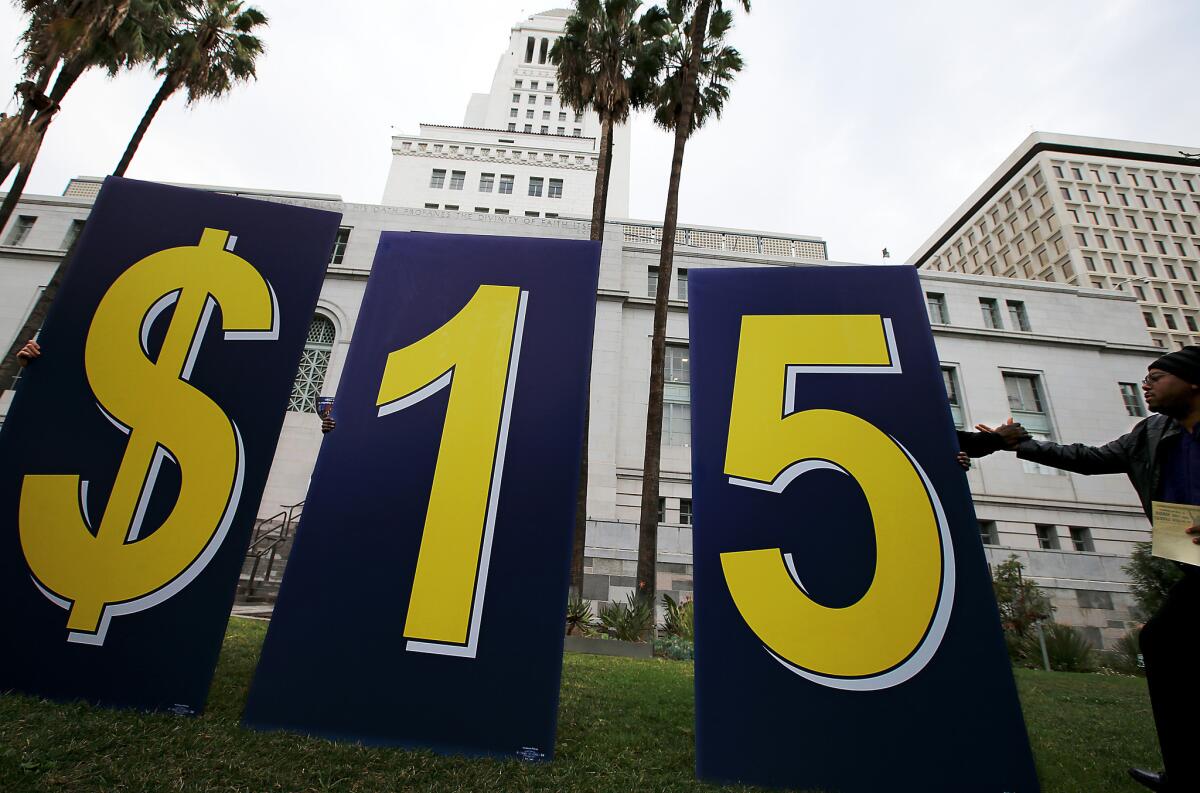Activists fasting outside L.A. City Hall tell council to hike minimum wage

- Share via
A light breeze blew outside Los Angeles City Hall on Tuesday as a nurse took the blood pressures of eight women in the midst of a 15-day fast designed to pressure officials into approving a $15-an-hour minimum wage.
The temperature was in the mid-60s but the women were feeling chilly and their pressures dropped below normal as they have gone without food for a sixth day.
Anggie Godoy, a 19-year-old who makes $9 an hour as a cashier at a downtown McDonald’s, wore an orange shawl and took a sip of vitamin water as she waited her turn.
She and other fasters had just appeared before the City Council, urging them to implement the higher wage immediately.
“I want to go to college but I can’t,” Godoy told the officials, choking up, “because that is another bill, and how am I going to pay for that?”
Last year, Mayor Eric Garcetti proposed a gradual increase in the current $9 an hour minimum wage to reach $13.25 by 2017, with future increases automatically tied to an inflation index. Some city lawmakers want to boost it even higher, to $15.25 by 2019.
The proposals have sparked fierce debate. Though proponents say the raise would boost the economy and lift families out of poverty, business groups argue that a pay spike would reduce profits, forcing them to move out of the city or cut jobs.
Three studies released last month came to different conclusions on how the boost would effect the city’s economy.
The wait for a higher wage has gone on long enough, said Gilda Valdez, who serves as both president of the Los Angeles organizing committee for the Fight for $15 campaign and chief of staff for the Service Employees International Union, Local 721.
“The income inequality keeps growing,” Valdez, who is also fasting, told the council. “As far as we are concerned, we can’t wait five years to get to $15 an hour. We need it now.”
The fast comes in the wake of protests across the nation calling for a $15 minimum wage.
Faster Mary Carmen Farfan, 46, and her husband support a daughter who attends UC Riverside. They pay $1,236 a month in rent and take care of three other children on their minimum wage salaries.
The family can’t afford enough beds so she and her husband sleep on a couch and rely on government assistance. Thinking of how she will afford college tuition for another child gives her anxiety, she said.
In an interview last week, Farfan said “People want their fast food but they don’t want to know the stories of how we struggle to live.”
The group of eight core fasters have been visited by supporters and faith leaders since they began last week. They spend each day outside City Hall under a large white tent and sleep either at homes or in churches.
Martha Sanchez, 43, joined the fast Monday. She has tried to make ends meet living in a South Los Angeles home with 19 people -- three families in all -- supported by three earners who make between $9 and $13 an hour.
The proposed higher wage plans, she said, don’t go far enough.
“Thirteen dollars an hour wouldn’t make a difference out here,” she said. “We need $15.”
Follow @jpanzar
More to Read
Inside the business of entertainment
The Wide Shot brings you news, analysis and insights on everything from streaming wars to production — and what it all means for the future.
You may occasionally receive promotional content from the Los Angeles Times.











